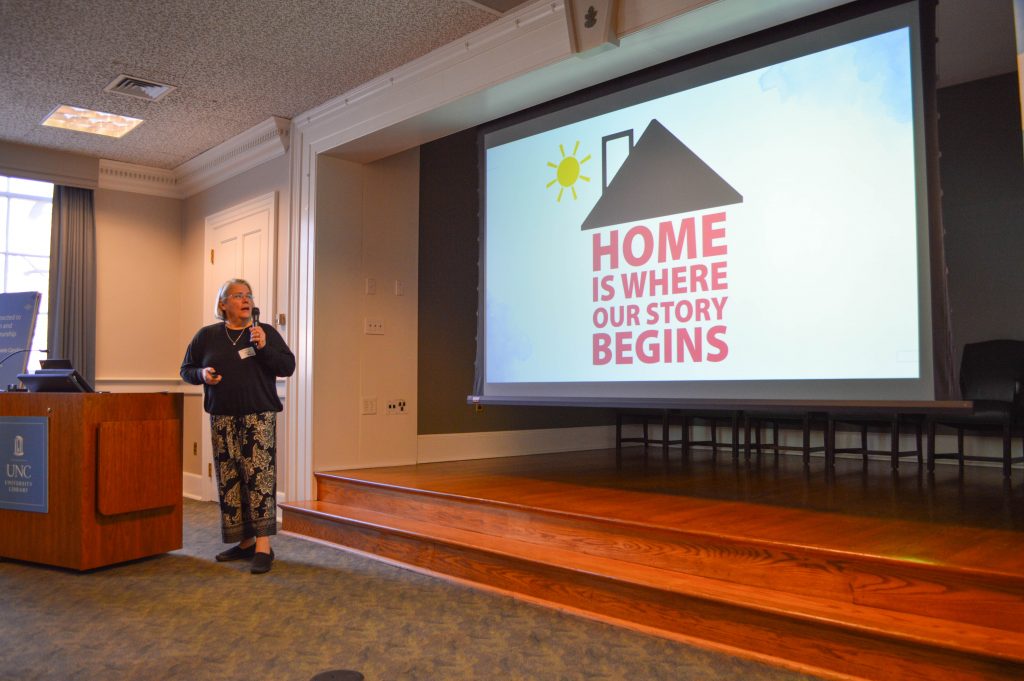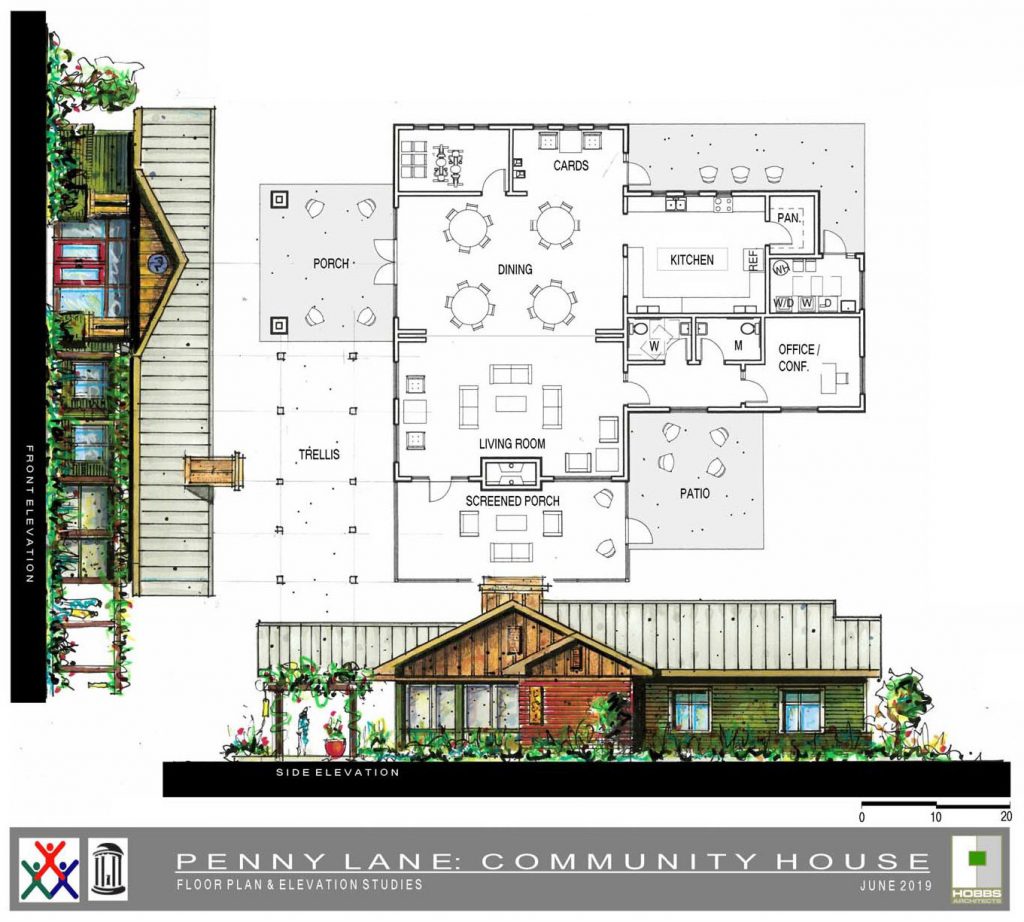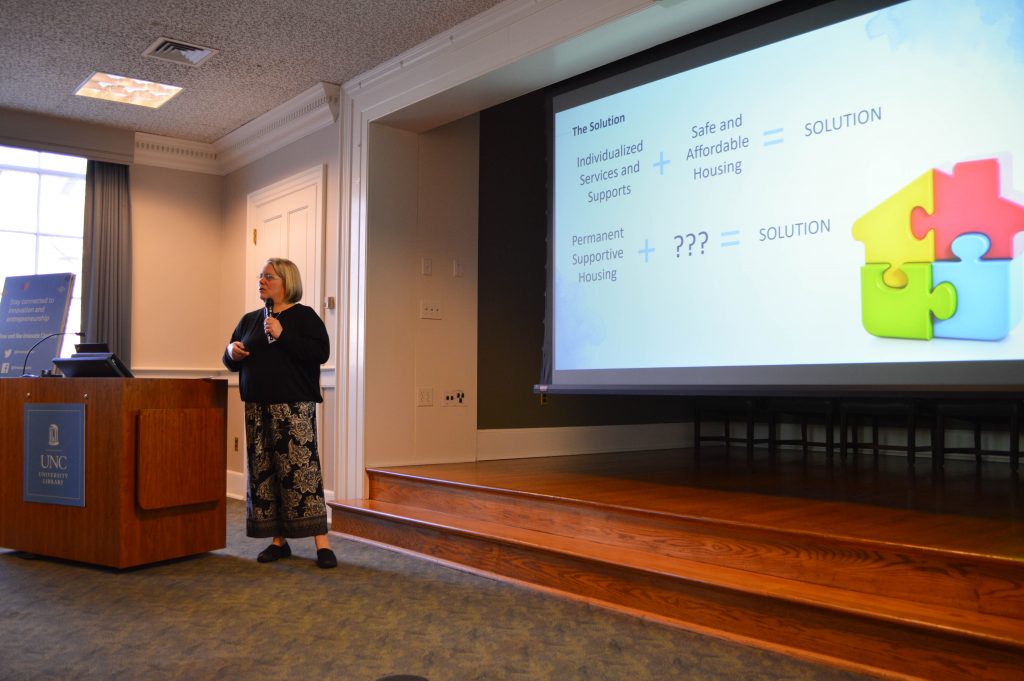Written by Eve Elliott ’21
326 square feet is not a big space. But Amy Blank Wilson, Ph.D., a Thorp Faculty Engaged Scholar, will tell you that 326 square feet can make a big difference.
That measurement spans the dimensions of one house in the Tiny Homes Village, an affordable housing project at the center of Blank Wilson’s engaged scholarship.
As a researcher and social worker, Blank Wilson has spent years studying mental health care. Along the way, she recognized a national vulnerability: homelessness among people living with mental illness.
“If you’re fighting to survive, you can’t think about how you might thrive,” explained Blank Wilson, who is an associate professor in the UNC School of Social Work.

While researching mental health programs that encourage this social thriving, Blank Wilson met Thava Mahadevan, executive director of XDS, Inc, which offers care and services to individuals living with mental illness. In his client interactions, Mahadevan, too, noticed the ubiquitous need for affordable housing that would empower clients living with mental illness.
“We were extremely frustrated,” Mahadevan remembered. “There is so much evidence now to show that housing is healthcare.”
The frustration intensified as Mahadevan found that his clients’ fixed income barely covered rent for Orange and Chatham County apartments, let alone budget for their enrollment in supportive programs. Mahadevan and Blank Wilson wanted to identify a new solution that would encourage health and independence among their clients.
In his research, Mahadevan stumbled upon a creative answer: building small.
By partnering with local housing partners, Blank Wilson and Mahadevan are now creating the Tiny Homes Village. The project consists of15 free-standing homes, shared community amenities and resident access to The Farm at Penny Lane, an alternative therapeutic farm facilitated by XDS, Inc.

This community-building yet individual-empowering model departs from the traditional co-living model by encouraging autonomy among clients. Entering new territory in housing, the Tiny Home Village team knew that extensive research was necessary to create a successful and replicable model.
That’s where Blank Wilson’s expertise came in.
As co-director of the Tiny Homes Village, Blank Wilson incorporates her research in planning the project. Building upon years of system-wide analysis, Blank Wilson expands the project’s benefits by connecting on a personal level with clients and their deep concerns.
“When I ask people to dream with me, they talk about a homeowners’ association, pool and walking trails,” she explained.
Blank Wilson works with the Tiny Homes Village design team to incorporate these wish list items into the Tiny Homes design. She and her partners hope to formulate a replicable housing model as a health tool for clients living with mental illnesses everywhere. Recognizing the strength of Blank Wilson’s fusion of research and service goals, Carolina Center for Public Service named her a Thorp Faculty Engaged Scholar (TFES) in 2018. As an engaged scholar, Blank Wilson develops her project and research with help from a network of similarly minded change-makers.
Blank Wilson derives encouragement from sharing her challenges and successes within this network.
“I’m learning from other people things that haven’t even occurred to me that might happen,” she said.
In addition to networking with her fellow Thorp Scholars, Blank Wilson has also used TFES to connect with other researchers in her field. With funding from TFES, Blank Wilson collaborates with colleagues as far away as Australia to study alternative mental health and justice models. Furthermore, Blank Wilson received a grant from the National Institute of Mental Health, through which she and her doctoral students are testing an intervention she developed in North Carolina’s prisons.

Speaking about the Tiny Homes Village, she said: “This is the most engaged scholarship I’ve ever done. I’m out in the community working hand in hand with a partner. It is one of the hardest things I will ever do in my career, and yet it is probably one of the most meaningful.”
As the Tiny Homes Village is set to start construction in 2020, Blank Wilson is excited to continue exploring how her research can create community-wide change.
“My work as an engaged scholar is to make sure this story doesn’t become about me.”
